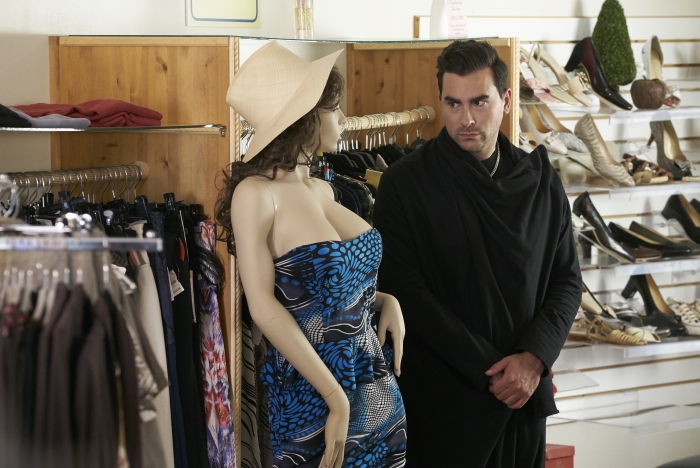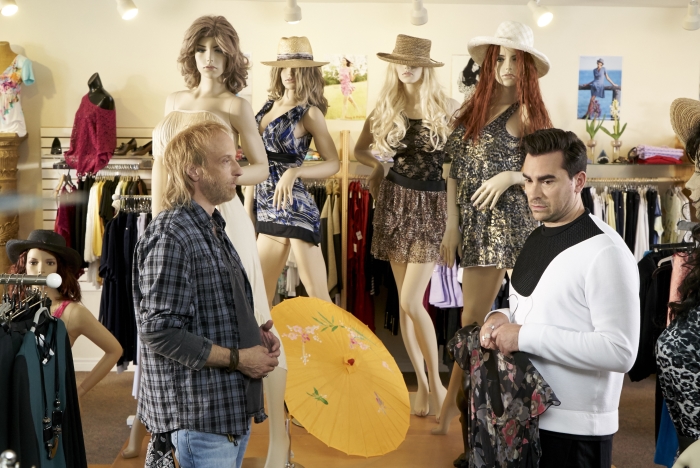
Up Schitt’s Creek Hilarious Lesson on Tax Deductions. Wouldn’t it be great to be so rich that you didn’t even have to think about tax deductions? As seen on the Canadian television sitcom, Schitt’s Creek – what goes up must come down. Someone else may be worrying about your small business tax deductions for the ultra-wealthy but for the vast majority of taxpayers, tax planning stress falls squarely on their shoulders. Time and again, Schitt’s Creek wraps financial lessons in laugh-out-loud comedy.
Update: Season 6 of Schitt’s Creek is Now Playing on POP TV !! Make sure to check it out.
By David Rae Certified Financial Planner™, Accredited Investment Fiduciary™
Lessons in tax deductions can be found in news articles, online, in movies and these days even on the Canadian television sitcom, Schitt’s Creek. In season two, episode six, titled “Moira vs. the Town Council”, David (played by Daniel Levy) gets a job and learns a lesson in tax deductions and how they work. He later discovers that they don’t make his purchases free. Season 4 is now playing on POP.
Without spoiling the entire show, here is the gist of what happened. David, the son of a former Zillionaire who is now essentially broke, gets a job at “Blouse Barn” and goes on a spending spree with tax-deductible business expenses. When his father Johnny Rose (Eugene Levy) calls out David on his lavish spending he empathically replies, “It’s a write-off!”
Johnny: “Do you even know what a tax write-off is?
David: “Yeah, it’s when you buy something for your business and the government pays you back for it.”
Do They About Taxes on Schitts Creek?
The scene continues and it is clear that David does not have a clue how tax deductions work or taxes for that matter. While David is a completely over-the-top pansexual – his understanding of the US tax code probably isn’t that far off that knowledge level of the average American Taxpayer. If you haven’t seen this show check it out. We have watched it several times with friends.
How a Tax Deduction Works in Schitt’s Creek and Elsewhere
If you have deductible expenses, such as charitable donations or money spent to operate a business, you can deduct that expense dollar-for-dollar from your taxable income. This is not a dollar-for-dollar reduction of your taxes owed.
That being said, a tax deduction can only lower your tax bill by pennies on the dollar and this is what tends to confuse a lot of people. For example, let’s say you are in the highest federal tax bracket, which is currently 37%. You have $1,000 in deductible expenses but your tax bill will be reduced by only $370, not $1,000.
It’s not free money from the government just because the money is being spent to run a business like David believed it to be.
Would you spend $1,000 just to save $370? What if that $1,000 helped grow your business? The latter case would make sense to business owners because the tax deduction would make it easier to invest in their businesses. On the other hand, if those business owners just wanted to lower the amount they owed in taxes, it would be cheaper to keep the $1,000 and pay the taxes due on their income.
Don’t buy things just to get a tax deduction. Ewww, David.
Should you spend like David on Schitt’s Creek for Larger Tax Deductions?
During the episode of Schitt’s Creek when David thought all of his spending could be written off, he admitted that he didn’t know much about tax deductions. He purchased expensive face cream, sheets, a lamp and a bunch of other things that aren’t tax write-offs and aren’t deductible. They added no value to the business, Blouse Barn in this case. “The write-off people will pay for it,” he said.
“That is not a (tax) write-off,” Johnny said to his son, David. “This is not a (tax) write-off. You can’t just buy things for yourself and write them off.” Unfortunately for David, he didn’t understand that tax deduction would only help to lower his current tax liability.
Ultimately, he, as an individual, would still have to pay for all of the things he purchased for his shop and that he should have spent wisely. There was no tax write-off fairy coming to give him all of that money back.
If something will help grow your business or make it run more smoothly, it may be a good investment. On the other hand, if you are just buying a tractor to get a tax break and don’t have any use for it, you are just flushing money down the toilet.
Schitt’s Creek To The Tax Deduction Rescue
The good news is you don’t have to know really anything more than David in order to minimize your tax bills and stay on track for financial freedom. Enjoy binge-watching Schitt’s Creek. Season four is now playing on Pop TV and is also available for purchase on Amazon. This frugal gay financial planner actually spends money to buy the seasons, so I could watch them over and over on demand.
Watching this sitcom is more fun than studying the tax code unless you are a money nerd like me.

Live for Today, Plan for a Richer Tomorrow.
DAVID RAE, CFP®, AIF® is a Los Angeles Certified Financial Planner with DRM Wealth Management. A regular contributor to Advocate Magazine, Forbes.com, Investopedia not to mention numerous TV appearances. He helps friends of the LGBT community across the USA get on track for their financial goals. For more information visit his website at www.davidraefp.com
If you loved this post about Schitt’s Creek Tax Deduction you may also love:
Golden Girls Retirement Plan: Part 1












[…] Tax Deductions + Other Fun with Schitt’s Creek on Pop […]
[…] Tax Deductions + Other Fun with Schitt’s Creek on Pop […]
[…] of your take-home pay on rent. (May be able to push this a little higher if you own your home, the tax deductions may save you some on the actual net cost). 10% on utilities, transportation, and 10% on groceries […]
[…] Authors Notes….this last line was written before Schitt$ Creek was a thing. Thanks. EEEEEWWWWW, David. […]
[…] which means you can direct the funds to multiple non-profit organizations. Donors will receive a tax deduction in the year they make the contribution to the DAF. The money can stay in the fund (and likely be […]
[…] end up in a higher tax bracket together, this may also be coupled with a reduction of potential tax deductions. If this is your first year filing together, you might want to see if a gay financial planner or […]
[…] as attainable. Tax-loss harvesting is slightly additional work for the advisor, however the tax savings for you could be […]
[…] as tax-efficiently as possible. Tax-loss harvesting is a little extra work for the advisor, but the tax savings for you can be […]
[…] a great way to ensure you have a retiremetn income you can’t outlive, while benefitting from huge tax deductions along the […]
[…] a ROTH 401(K). Before that, I just wanted to cover the basics of a ROTH IRA. You won’t get a tax deduction for making contributions like you would with a traditional IRA or 401(K). On the other hand, you […]
[…] wants to pay more taxes than they absolutely have to. The US tax code provides a ton of tax deductions that can help lower your tax liability if you end up itemizing. If you take the standard deduction […]
[…] your lifetime, not just the current tax year. At the same time, it may help you find all of the tax deductions you are entitled to today. Furthermore, ensure that your investments are managed in a tax-efficient […]
[…] credit card debt, your strategy may differ. It would help if you contributed to an HSA to get one tax deduction. However, you may want to reimburse yourself for medical expenses as they come in. There’s no […]
[…] know (many people don’t), simply put, a tax deduction (also often called a “tax write-off“) is an expense that you can deduct from your income to reduce your taxes due. In the […]
[…] way, the expenses you incur volunteering may add up to a nice tax deduction. To qualify, the amount you are planning to deduct must directly relate to the charity where you […]